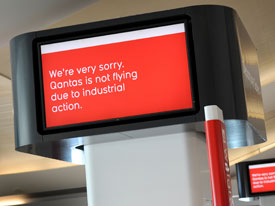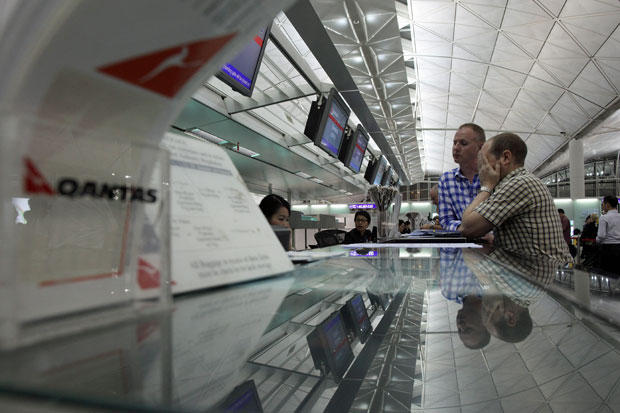Qantas grounds all flights over jobs row
All 108 Qantas aircraft have been grounded indefinitely and staff are to be locked out, as the company responds to recent strikes over proposals to move jobs overseas.
The airline issued a statement this morning saying that all its domestic and international flights will be stopped until further notice. Flights in transit would continue to their destination, but all other flights would be stopped from taking off.
The company say it will lock-out staff from Monday morning until three unions behind recent industrial action move to “drop their extreme demands”.
Qantas staff have been striking over infrastructure changes and proposals to move some operations to Asia.
Tens of thousands of passengers will be hit and the lock-out will cost the company an estimated $20m per day.
The airline is offering full refunds to any customers that are hit by the strike and has promised them flights at a later stage – although there is no indication at this time when flights will resume.
Have you been hit by the grounding of all Qantas flights? Tell us #c4news
The Australian government is urgently looking to setup emergency talks to resolve the dispute and says the grounding could have implications for the country’s economy.
The Australian Transport Minister, Anthony Albanese, said the government was caught by surprise by the move:
“We were notified only mid-afternoon with no advance notice from Qantas at any stage.”
Qantas apologised on its website to customers but blames the unions for the need to ground its flights:
“We understand that this will have a significant impact on our customers and apologise for the inconvenience that the damaging union action has caused.”
“Aircraft currently in the air will complete the sectors they are operating. However, there will be no further Qantas domestic departures or international departures anywhere in the world. This will have an estimated financial impact on Qantas of $20 million per day.
“The lock-out will continue until the ALAEA, the TWU and AIPA drop the extreme demands that have made it impossible for agreements to be reached.”
How are other flights affected?
If you've booked a ticket with Qantas, you're not travelling anywhere for the time being.
However if you've booked your ticket with another airline, say British Airways, who will use Qantas as a carrier then that airline will try to find a new flight for you.
However, as so many people have been hit it's currently unlikely they will find a space for you.The advice, as always, is to contact your airline.
A spokeswoman for British Airways, which has a joint services agreement with the airline, said: "British Airways-operated flights between the UK and Australia are not expected to be disrupted at this time."Customers who are booked to travel on a British Airways service operated by Qantas are urged to check the status of their flight.
"If your travel commences within the next 24 hours please contact our call centres to discuss alternatives."

Passengers stranded at airports by the grounding vented their frustrations:
“I’m proudly Australian but it just leaves a really bad taste in your mouth,” said Zoe Johnson, an Australian living in Switzerland. “So many people say ‘I’m never going to fly Qantas again’ and from my point of view it just feels like a bullying tactic really.”
Briton Lynn Gray said: “They just sort of said ‘unfortunately flights, internal and domestic and international, are cancelled so sort yourselves out, bye.'”
In mid-October, Qantas grounded five jets and reduced domestic flights to nearly 100 flights a week because aircraft mechanics had reduced the hours they were prepared to work.
Qantas angered unions when it said it would improve its loss-making overseas business by creating an Asia-based airline with its own name and brand.
The five-year restructure plan will see the removal of 1,000 out of 35,000 Qantas’ jobs.
Unions were incensed when it was announced in September that the Qantas CEO, Alan Joyce, was to receive a 71 per cent pay rise. The airline responded by saying that the figure did not portray the full picture and that Joyce effectively had taken a 9 per cent pay cut. Joyce received a $3.04m salary.
“Mr Joyce’s salary is not excessive compared with other large Australian companies,” a Qantas spokesman said. “His actual salary in 2010-11 was 9 per cent lower than last year and Qantas executives have not been awarded a cash bonus for the past two years.”
Tony Sheldon from The Australian Transport Workers Union told reporters on Saturday that he was seeking more information on the government’s call for emergency arbitration:
“This is a pre-conceived, pre-planned attempt to hoodwink the shareholders, hoodwink the Australian community and to destroy the Qantas brand,” Sheldon said.
Qantas estimates these strikes have cost the company more than $15m per week.
The airline suffered further setbacks earlier this year with a catalogue of engine problems with its prize A380 fleet, causing them to be grounded after a series of fires, faults and one case, mid air explosion.
